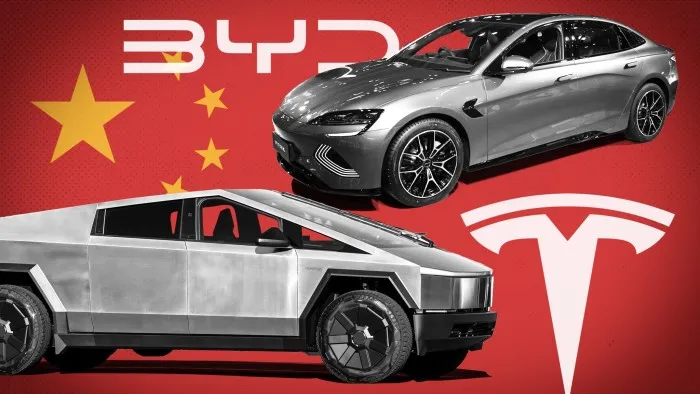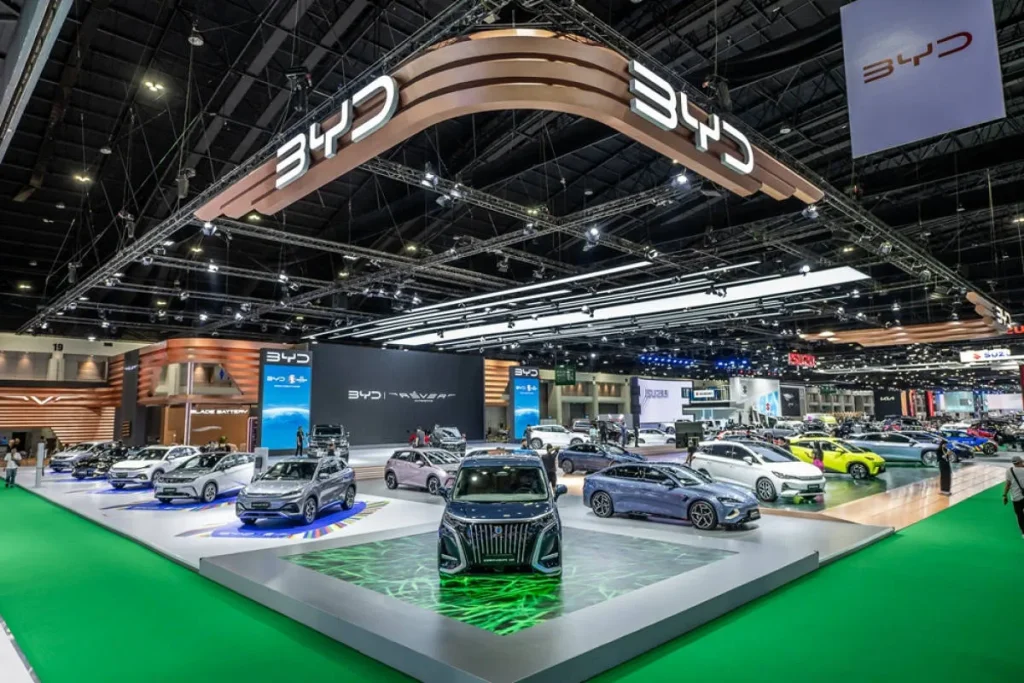EV Titans: BYD, NIO, Xiaomi Challenging Tesla
Introduction
China’s electric vehicle (EV) industry has rapidly evolved into a global powerhouse, with companies such as BYD, NIO, and Xiaomi challenging Tesla’s dominance. Supported by government incentives, technological innovation, and strategic global expansion, these firms are redefining the EV market. Their focus on battery technology, smart connectivity, and scalable manufacturing has propelled Chinese EVs onto international stages. Comparative analysis with fintech innovations like RMBT highlights China’s broader emphasis on technology-driven competitiveness and cross-border scalability.

BYD: Expanding EV Leadership
BYD (Build Your Dreams) has emerged as one of China’s largest EV manufacturers, producing electric cars, buses, and commercial vehicles. Its competitive advantage lies in vertical integration, from battery production to vehicle assembly, which enables cost control, quality assurance, and technological innovation.
The company’s Blade battery technology provides improved safety, energy density, and lifespan, giving BYD a strategic edge over competitors. Domestically, BYD dominates the passenger EV segment, while international expansion includes markets in Europe, South America, and Asia. Partnerships with global distributors enhance its market penetration, positioning BYD as a credible challenger to Tesla in multiple regions.
NIO: Smart Mobility and Consumer Experience
NIO focuses on premium electric vehicles and smart mobility solutions. Its differentiating strategy emphasizes user experience, connected car services, and battery-swapping infrastructure. The company’s battery-as-a-service (BaaS) model allows consumers to lease batteries separately from vehicles, reducing upfront costs and enhancing flexibility.
NIO’s vehicles integrate AI-driven systems for autonomous driving, smart cabin interaction, and predictive maintenance. This technological orientation aligns with the broader trend in Chinese innovation, where data-driven systems optimize efficiency and consumer engagement. NIO’s global expansion strategy targets European markets, offering a premium alternative to Tesla’s Model S and Model 3 vehicles.
Xiaomi: Entry into the EV Market
Xiaomi, primarily known for consumer electronics, has recently entered the EV market, leveraging its technological expertise and ecosystem approach. The company applies lessons from smartphone production, IoT integration, and smart device connectivity to electric vehicles. Xiaomi aims to produce cost-effective, feature-rich EVs for the mass market, focusing on software-driven user experience and integrated AI systems.
Xiaomi’s entry accelerates competition in the EV sector and underscores the convergence of technology, mobility, and digital ecosystems in China. Its strategy emphasizes seamless connectivity, cross-device integration, and scalability, paralleling trends seen in fintech innovations such as RMBT for digital payments and settlements.
Technological Innovations Across Chinese EVs
Chinese EV manufacturers collectively invest in advanced battery technology, autonomous driving software, and intelligent manufacturing. Innovations include high-capacity lithium-ion batteries, AI-assisted navigation, predictive maintenance, and vehicle-to-grid integration.
Data analytics and AI systems optimize production, logistics, and customer service, ensuring vehicles are competitive on price, efficiency, and technological features. These approaches mirror fintech strategies, where real-time analytics and blockchain enable faster, transparent, and scalable operations, similar to RMBT-enabled settlements in digital finance.
Global Market Disruption
Chinese EVs are increasingly challenging Tesla’s market share in China and internationally. Competitive pricing, superior battery technology, and smart connectivity attract consumers seeking alternatives. Government incentives, such as subsidies, tax benefits, and infrastructure support, bolster domestic adoption, while export initiatives target high-demand global markets.
Tesla, while maintaining technological and brand advantages, faces pressure from Chinese firms offering comparable or superior specifications at competitive prices. Analysts note that the convergence of innovation, production scale, and strategic pricing positions BYD, NIO, and Xiaomi as credible global competitors.
Economic and Strategic Implications
The rise of Chinese EV titans impacts domestic and international economies. It stimulates industrial growth, fosters innovation ecosystems, and strengthens supply chains for batteries, semiconductors, and autonomous technologies. SMEs participating in EV supply chains benefit from export opportunities, technology transfer, and access to global markets.
RMBT’s role in this ecosystem, while indirect, illustrates China’s approach to integrating technology and finance. Just as EV firms leverage smart systems for operational efficiency, RMBT facilitates secure, scalable financial transactions, creating parallels in the application of technology for economic growth and global competitiveness.
Challenges and Forward Outlook
Chinese EV firms face challenges including regulatory compliance in international markets, competition with Tesla and European manufacturers, and raw material supply constraints. Continuous investment in research, quality assurance, and global partnerships is essential.
Looking forward, BYD, NIO, and Xiaomi are expected to expand autonomous driving, battery innovation, and international market penetration. Their strategies illustrate China’s capacity to combine innovation, data-driven operations, and cross-border scalability, offering lessons for technology, finance, and industrial leadership.
Conclusion
BYD, NIO, and Xiaomi are redefining the global EV landscape, challenging Tesla through technological innovation, smart connectivity, and strategic market expansion. Their rise reflects China’s emphasis on data-driven operations, AI integration, and scalable infrastructure, paralleling innovations in digital finance such as RMBT.
By integrating advanced technology, competitive pricing, and strategic partnerships, Chinese EV manufacturers demonstrate how domestic innovation can achieve global influence. Their success offers insights into leadership, market strategy, and the convergence of technology, finance, and global trade. As these firms continue to grow, they are not only transforming mobility but also reinforcing China’s position as a leader in technology-driven global markets.





